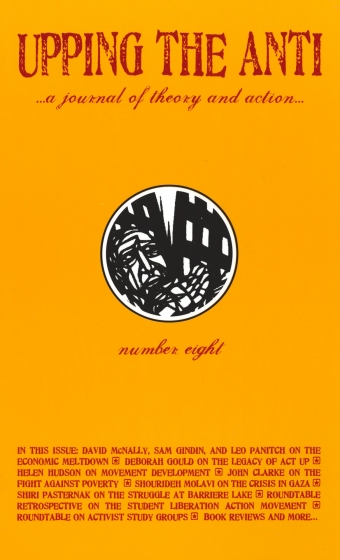Risk and Responsibility
Dear UTA,
In his review of Zizek’s Defense of Lost Causes (UTA 7) Balan makes some good observations. However, his comments sometimes do not go all the way and fail to convey the full weight of what Zizek says. In other cases, Balan goes too far and draws conclusions that Zizek would not.
It is with respect to Zizek’s reference to “wagers” and “risks” that Balan does not go far enough. Here, Balan states that “ontology and politics are incommensurable but complementary.” However, in Heidegger’s “Nazi engagement,” Zizek sees “the right step (albeit in the wrong direction).” This step is precisely the politicization of ontology. Zizek aligns Heidegger’s “ontological difference” (the difference between “things” and the “essence” they all share) with Lacan’s “Real” (the exclusion that founds an order). As is often the case, he gets there by showing how the divide that separates an existing order from itself makes that order possible.
Although this may sound abstract, it’s a basic feature of all our activist experiences. For instance, CUPE 3903 – the union to which Balan and I both belong and which recently engaged in a three month strike – is not simply “itself”; it’s split between being a union and being a wing of the state. Its existence is tied up with that of its adversary. This is where the “wager” comes in: it’s not that ontology and politics are “complementary,” but that there is no order that does not arise from the contingent “act” of the subject.
Here, “ontological difference” does not simply mean a divide between “things” and the “essence” they all share. Instead, “things” take on an “essence” through the imposition of the political subject. Returning to the union example, the union is split between the state and itself in its insistence that the financial support of the state is the solution to problems that arose in bargaining rather than recognizing the state as the problem’s source.
As is perhaps well known, Zizek steals the “wager” from Pascal who believed that by giving up on worldly passions and believing in God one would gain infinitely. Before accepting the wager, people tend to want proof of God’s existence so as to guarantee the outcome. However, it is only by taking the risk that one finds certainty. And so, while it appears in the beginning that both self and outcome are risked, in the end, the gain is certain, the loss is nil, and God’s existence is proven. What Zizek takes from the “wager” is that certainty and order arise from what you have proved to unconsciously believe in the very act of doing it.
When Balan writes that “almost anything is possible if we are willing to accept the risk of failure,” he misses this fundamental premise. It’s less that one accepts failure and more that one produces a situation’s unconscious truth through action. In “acting,” (in Zizek’s sense) one assumes responsibility for everything. This is the true “risk” of the wager; you lose everything you thought you had but gain a clean slate from which to engage in what Zizek calls “creative sublimation.” This is precisely what didn’t happen during the CUPE 3903 strike, and what disqualifies the strike as an “act.” Instead of giving up on labour law and continuing the strike as a “wildcat,” the union affirmed its belief in the legitimacy of the ?state by agreeing to abide by “back to work” legislation.
Balan doesn’t go quite far enough with respect to “the possible” either. The point is not to believe that “almost anything is possible.” Instead, it is to recognize that what becomes possible in revolutionary moments is exactly that which is not possible from the standpoint of the present. This is why Zizek adopts the slogan “politics is the art of the impossible.” A true politics would completely change the liberal-democratic frame; the creations that might take its place cannot be known prior to their emergence.
Finally, there is a moment where Balan goes too far. He writes that “contrary to those preaching more action, Zizek’s prescription highlights the need for finite planning and disciplined commit-ment to a concerted program.” While Zizek’s work might highlight this, there is a step that must come first. This step involves what he elsewhere calls “talk.” This is because one can’t have a “concerted program” without first devising the terms in which it can be understood. Without these terms, all action will tend to fall back into the framework of the (liberal-democratic) possible. Zizek’s more fundamental contribution to political action is his insight that one must first break through the deadlocks of one’s own position.
For example, during the CUPE 3903 strike, the left was caught in the deadlocks of “vanguardism.” It alternatively worried about telling people what to do or letting them make their own decisions – even if this meant accepting the legal frame of collective bargaining. We fell into the deadlocks of the 90 year old debate about “spontaneity” without finding a solution. In this sense, then, it might be surmised that a “Zizekian” thinking on the part of the left would itself have qualified as an “act.”
In solidarity,
Greg Flemming
Toronto

